|
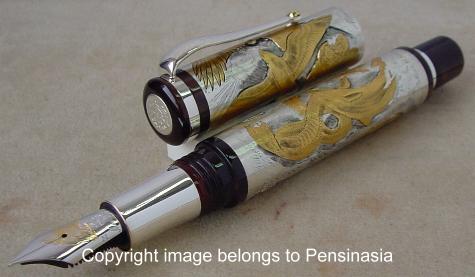

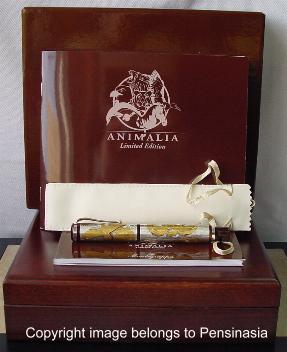
MONTEGRAPPA LIMITED
EDITION ANIMALIA
FOUNTAIN
PEN
To create Animalia,
Montegrappa employed a special technique: engraving with a burin, which is
a small scalpel used by highly specialized craftsmen to cut awa a fine
shaving from the metal surface, giving a two-dimensional impression of the
image.
This magnificent
achievement begins with the artist's design, reduced exactly to the
finished size. The design is then transferred onto tracing paper that is
fixed onto the smooth body of the pen. The barrel is covered with a thin
layer of gesso powder, which receives the lines when the design is traced
once more. The craftsman then outlines the design with a metal point to
delicately engrave the surface. The final engraving is made with the
burin, wielded either by the hand alone or with the aid of a hammer.
Finally, details are filled with gold, enhancing the work's value and
elegance by providing a contrast between the various elements of the
design. With Animalia, Montegrappa has permitted a depth of expression
never previously achieved, giving the craftsman the dignity of a sculptor
who has created a low-relief image from a decorative element. Animalia is
produced in numbered and limited edition of 1,100 fountain pens in
sterling silver (approx the number of endangered mammalian species in the
world), 300 rollerball pens in sterling silver (approx the number of
endangered reptile species in the world), 100 fountain pens and 100
rollerball pens in 18K gold (approx the number of endangered animal
species in Italy). Each 18K gold nib in the collection is engraved with
the design of a tiger, repeating the miracle of an engraving that is
remarkably profound and complex, even by the standards of Montegrappa.
The Seagul
Straddling land and sea,
and undaunted by either, the seagull synthesizes the nature of both
elements. To travelers, it announces the proximity of the coast and
anticipates the vastness of the open ocean. According to a legend of the
Lilloer Indians of North America, the seagull was originally the
proprietor of daylight, which it jealously kept in a box for its exclusive
use. It was the raven that, by a trick, succeeded in breaking ipen the box
for the benefit of humanity.
The Eagle
The eagle is the king of
birds, a symbol of spiritual enlightenment as it soars above the clouds
and sees the sun. It is as potent an image for the Hindus - whose god
Vishnu was transported by an eagle - as for the American Indians, whose
shamans have eagle's wings.
Nevertheless, the eagle has
a dark, nocturnal aspect, associated with its rapacity and excessive
self-glorification. It represents the sudden seduction, the passion that
consumes the spirit. As a bird of prey, it may seize its victim with its
claws and carry it to places from which it cannot escape, standing as a
symbol of inflexible and all-devouring power.
The Horse
According to a belief
rooted in humankind's collective memory, the horse, like the serpent, is
simultaneously bearer of life and death, linked both to fire - the
destroyer and victor - and to water, which nourishes or drowns. The horse
has a particular role. It is the vehicle, the vessel, connected
indissolubly to man. By day it gallops blindly and it is the rider who
directs its pure energy towards the destination, while at night, when it
is the man who cannot see, the horse becomes clairvoyant and guides him.
Harnessed to the chariot of the Sun, the white horse becomes the image of
perfect beauty, capable still of linking day to night, life to death and
action to passion in uninterrupted cycle.
The Lion and The Tiger
The big cats have always
fascinated man with their combination of strength and beauty, elegance and
aggression. The tiger evokes powerful, ferocious regality. Dionysus
transformed himself into a tiger to snatch the Nymphp Alphesiboea from the
bank of a river that then took the name Tigris. In China the tiger was an
animal of the North, associated with the winter solstice whose baleful
influences it devoured, and honoured as the mount of an Immortal because
of its legendary longevity.
Beautiful, fast and cruel,
the tiger stimulates fascination and alarm at the same time. Large and
powerful, it symbolizes instinct and anger, in contrast with the lion, the
king of the beasts, which represents sovereignty, the strength of divine
energy and even justice, like the lions next to Solomon's throne. In
Egypt, lions were linked to the sun and always shown in pairs, back to
back, to represent the two horizons and the course of the sun across the
arch of the sky.
In Animalia, Montegrappa
has engraved the tiger on the 18K gold nib with ebonite feeder as well as
on the barrel of the pen. The result is a design whose depth and
complexity exceeds any previous edition from Montegrappa.
The Dolphin
Associated with water and
transfiguration, the dolphin has been a symbol of wisdom and navigation
down the ages. Its image was carved at the feet of Apollo at Delphi, the
sacred region that may itself be named for the dolphin, since the creature
is symbolic of divination and prudence. Combined with its exceptional
speed, these qualities make it the master navigator. A legend of ancient
Greece tells how Dionysus was captured by pirates and bound to the mast of
his ship. He slowed the vessel by covering it with wreaths of vines while
causing the sounds of invisible flutes to be heard. The pirates were
seized with madness and threw themselves into the sea, where they were
transformed into dolphins. This explains why dolphins - the repentant
pirates - are friends of man and strive to help sailors.
The Serpent
To terrify the pirates and
induce them to plunge into the sea, Dionysus transformed the oars of his
ship into serpents. This too is an animal with clear symbolism: in their
hunting language, the Pygmies represent it as a line on the ground. The
serpent is a living line, capable of becoming animated and of transforming
itself. Quick as a flsh, it emerges from a crevice or fissure to spit
forth death or to grant continuing life before returning to invisibility.
It is enigmatic and secret; neither its decisions nor its metamorphoses
can be foreseen. It expresses aggression and strength and, at the same
time, it demonstrates circularity and the eternal return.
The serpent that bites its
own tail recalls the dynamic of the circle, apparently immobile because it
rotates around itself, and in perpetual transmutation between death and
life. It is no coincidence that, in India, a woman who wants a son will
traditionally adopt a cobra.


A special edition of Animalia
dedicated to the Peace Parks Foundation, a successful foundation of private
individuals with the invaluable cooperation of several African governments,
which is committed to setting up transfrontier conservation areas, also
known as “peace parks”. Montegrappa, a member of the Peace Parks
Foundation, aims to increase awareness of the concept of peace parks through
this Limited Edition, a writing instrument inspired by the animal world
which is represented along the pen body by the use of a special, exclusive
technique, burin engraving. Animalia for Peace Parks Foundation is produced
in a series limited to 450 fountain pens in sterling silver with precious
turquoise celluloid detailing.
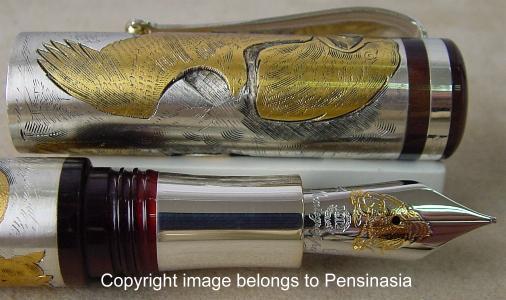
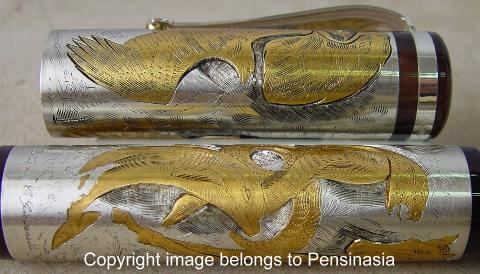

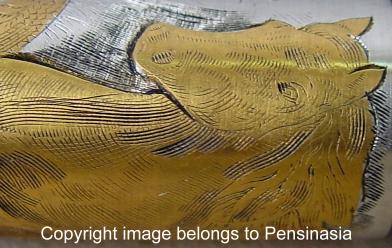

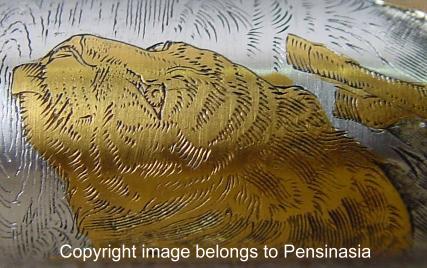
 . .
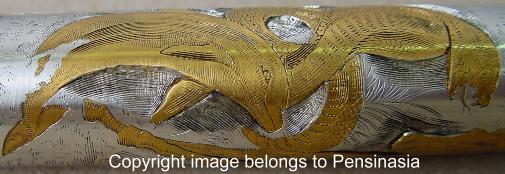



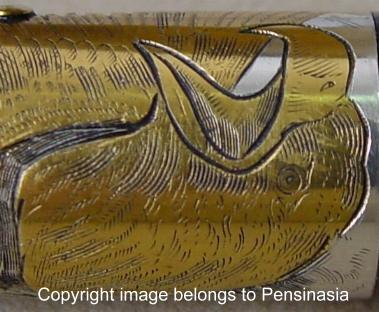

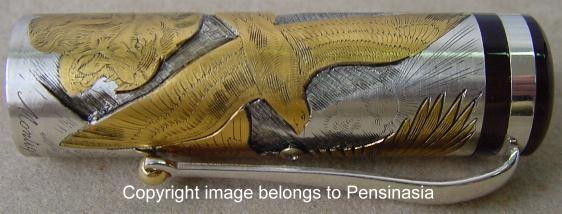
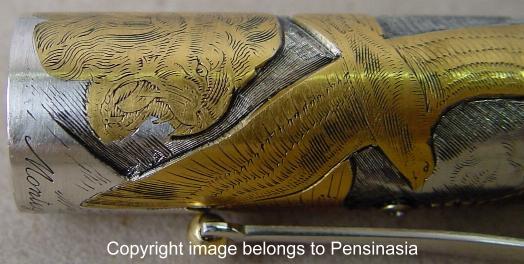

|
